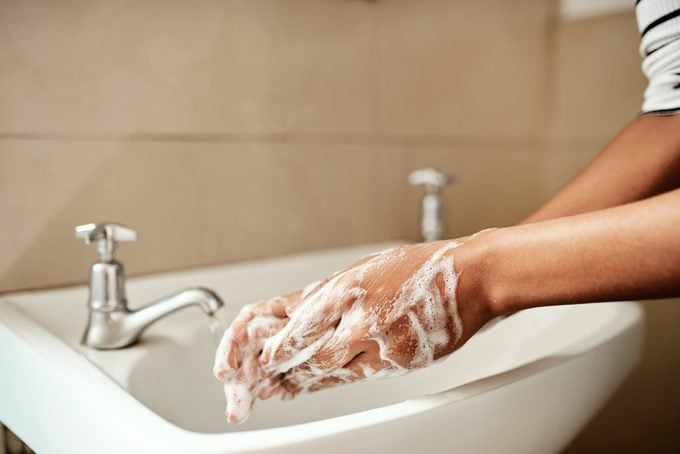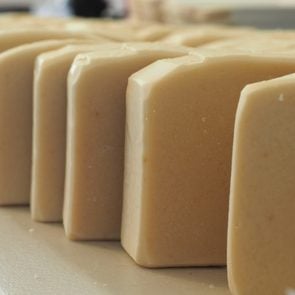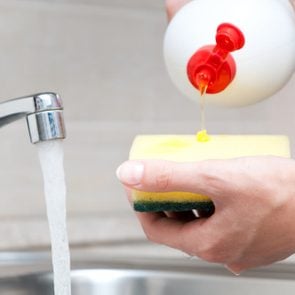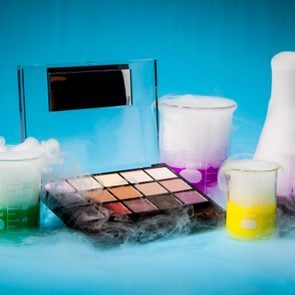Is Liquid Soap Better than Bar Soap?
Updated: Sep. 02, 2022
When it comes to killing germs and optimizing your skin health, should you reach for bar or liquid soap? Here are the advantages of each—and the soap formulation you should avoid.
Bar soap vs. liquid soap: Which is better?
The Covid-19 pandemic has made a lot of us more aware of how often (or not) we wash our hands. After all, hand-washing, along with wearing face masks and social distancing, is one of the three major rules to minimize the spread of Covid-19. Hand-washing in general is one of the most powerful ways nearly anyone can help prevent other illnesses..
With all this in mind, most of us can recall the early days of the pandemic when it seemed like soaps and hand sanitizers were impossible to find. As a matter of fact, the soap and body wash market saw a 194% increase during the first month of the Covid pandemic, according to the international market research consultancy, Research and Markets. We went from asking how often and how long we should wash our hands (for two renditions of “Happy Birthday,” in case you’re curious). Now we’re wondering which is better for skin health and killing bacteria and viruses: bar or liquid soap?
The answer: it depends.
Here’s what you need to know about bar soap vs. liquid soap, the advantages and disadvantages of each, and the type of soap formulation our experts say to avoid.
15 Signs You May Have Already Had Covid-19, Doctors Reveal
What is soap exactly?
The bottle or bar of “soap” next to your sink likely isn’t real soap. Turns out, the U.S. Food and Drug Administration (FDA) has a strict definition of what “soap” is, saying soap must combine fats or oils with an alkali such as lye. Most popular “soaps” on the market—both bar and liquid—are made from synthetic ingredients, so they don’t actually meet the definition of soap.
Not sure which type your cleanser is? If it foams or produces lots of suds, it’s likely synthetic.
Synthetic detergents aren’t bad for you, and they do work, but many people turn to traditional soaps as a way to avoid chemicals, protect the environment, and support local businesses. (Check out our clean skin care guide for people who hate chemicals.)
Which soap removes more dirt and germs?
When it comes to getting your skin squeaky clean, you can rest easy. The style of soap you use is a matter of personal preference. From a sanitary perspective, as long as they contain cleansing ingredients, it doesn’t matter what form they are in.
“Whether soap comes in a bar or in a liquid form, they are both equally effective at reducing pathogens and removing dirt,” says Rachel Burns, MD, a dermatologist in Edina, Minnesota, and a consultant for Sond Skin, a skincare company that makes both liquid and solid soaps.
(Here’s everything you need to know about antibacterial vs. regular soap.)

Which soap is better for skin health?
This is where it can get tricky, as it really depends on what you’re looking for. We asked our experts to break down different categories of skin care and decide which type of soap is best for that particular need.
Use liquid soap for hydration
If you’re looking to keep your hands from getting dry and cracked, you may have better luck with a liquid formulation. “Bars of soap often have a high pH, which can cause your skin to dehydrate and dry out more easily,” says Dr. Burns.
However, many bar soaps these days are infused with oils and substances that moisturize the skin, says Ryan Smith, PhD, a biochemist and entomologist (bug researcher) in Beaverton, OR.
Is Goat Milk Soap Good for Your Skin?
Use bar soap if you want cleaner ingredients
It’s important to be mindful of the ingredients in your soap because many chemicals can cross through your skin and into your bloodstream, says Dr. Burns. The more you wash your hands, the higher the potential for the accumulation of toxic ingredients.
Most bar soaps contain fewer and more natural ingredients than liquid or foaming soaps. (They’re also more likely to be true soaps.) But it’s not impossible to find liquid soaps with similarly clean formulations.
Ingredients to look for include glycerine (a cleanser that seals moisture in the skin) and essential oils (lemon, lavender, rose, and cedarwood oil). Some soaps will also add coconut oil, sweet almond oil, shea butter, or coconut butter to further soften the skin.
Beware of ingredients like triclosan (banned by the FDA in 2018 but still found in some products overseas) and parabens (preservatives that extend the shelf life of cosmetics). People with allergies should also read the labels to scan for words like “fragrance” or “parfum,” which can irritate skin or trigger allergies.
These Are the Only 3 Skincare Products a Dermatologist Says We All Need
Use liquid soap for minimal contamination
Bar and liquid soaps are equally effective cleansers from an ingredient standpoint. But their packaging might make a difference in how they clean.
Bar soaps generally sit in a damp puddle on the edge of a moist sink or in a soap dish, making them more likely to grow germs. “Bar soaps do harbor germs,” says Smith.
It’s still not 100% clear whether those germs transfer to your skin when you wash. There’s not much research on this, though an early study found that bacteria-covered bars of soap didn’t transfer bacteria during washing. But Smith says the germs can transfer to you when you use the soap.
Use bar soap if you have allergies
People with allergies or sensitive skin do better with soaps that contain fewer ingredients—and the ones they do have are more natural. They should also avoid fragrances and colors. That’s usually easier to find in bar soap formulations. “Bar soaps contain fewer chemicals which means less of a chance for a reaction on your skin,” Smith says.
Use liquid soap if you’re sharing
If you share a bathroom with others, the packaging of liquid soap makes it a friendlier option. “Bars of soap have a higher probability of accumulating bacteria and contamination when compared with liquid soap, especially if you live with other people,” says Dr. Burns. “If someone in the household is sick, you can easily pick up their germs if you have both shared the same soap bar.”
Just be sure to clean and sterilize the outside of the bottle regularly. It’s one of the little things people forget to clean but should.
Avoid foaming soaps
Sure, foaming soap is fun, but you may want to think twice before putting a bottle of it next to your sink. “You should avoid foam soaps, as they don’t encourage lathering as well as normal liquid soaps or bar soaps and can make it harder to clean your hands properly,” says Smith.
The bottom line
When it comes to bar soap vs. liquid soap, our experts suggest picking one that will make you the most likely to use it regularly and thoroughly. The best soap also depends on your specific cleaning needs, such as whether you need more hydration or if you’re looking for something that’s environmentally friendly.
Next, learn about the safest dish soaps to buy.
For more wellness updates, follow The Healthy on Facebook, Instagram, and Twitter. Keep reading:




